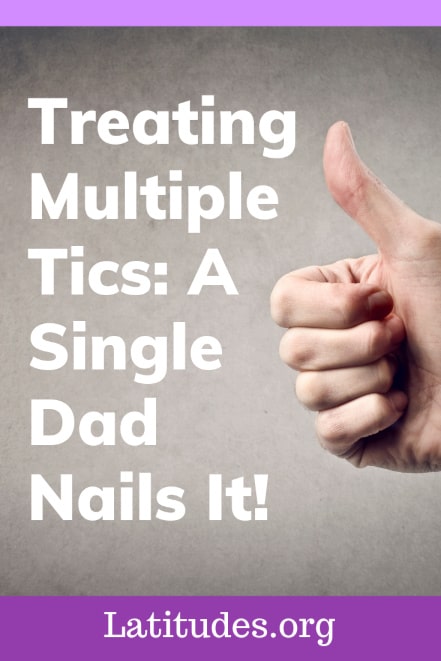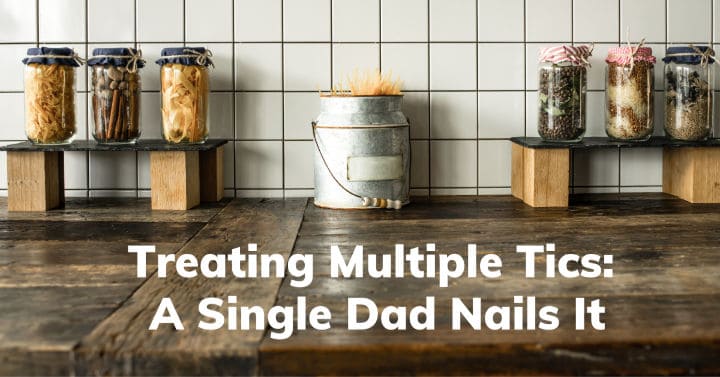Treating Multiple Tics: A Single Dad Nails It
Todd Davis with his daughter, Victoria Barrios
Editor: It’s always rewarding to receive feedback from someone who was helped by Latitudes decades ago. This testimonial from a father includes a follow up Q and A with the young girl he described. That girl is now a young adult, Victoria Barrios. She is establishing a counseling career to share her health insights with others.
Todd: Near the end of my daughter’s second grade school year, I noticed that Victoria started making some repetitive movements with her body, mostly with her neck, head, and eyes. With her head and neck, the movements were jerky and recurring. With her eye tic, she would frequently roll them backwards.
She had an obsession to touch things, and she also started making unusual repetitive vocalizations, whistle sounds, and other vocal tics that she had no control over.
Victoria’s teacher noticed these issues as well and brought them to my attention. I had no idea what was actually going on—this was all new to me—so I started researching what might be the root cause. I wanted to explore what solutions might be available as a cure.
What I discovered was that Victoria was exhibiting tic symptoms that are usually seen with people who have a diagnosis of Tourette syndrome. But there was very little information on how to treat it, except to suppress the condition with medications/drugs. This was 1989—twenty years ago!
By chance, however, I came across a publication called Latitudes. It offered information on ways to treat Tourette’s naturally, without the use of pharmaceuticals.
Intrigued, I signed up for a newsletter subscription. It was only available in print at the time, and while waiting for the first copy to arrive in the mail from Florida, I took Victoria to see a neurologist. He basically told me what I had already learned about the use of medications for her symptoms. I was mostly interested in learning about the side effects she might experience on the standard drugs, and whether they would be needed now—or if she would she outgrow any need for them.
Unfortunately, I did not hear any answers from the doctor that I was comfortable with for my young daughter. There was no guarantee that the meds could help her, and the side effects were worrisome.
Learning more about natural approaches
 Meanwhile, I became more informed about the natural remedies discussed in the Latitudes publication, and decided to try the natural way first. Drugs would be a last resort.
Meanwhile, I became more informed about the natural remedies discussed in the Latitudes publication, and decided to try the natural way first. Drugs would be a last resort.
“Going natural” had its own set of challenges. As a single father with custody of my daughter, I could make necessary changes to my daughter’s diet. But I also had to convince other family members who played a role in what Victoria did and did not eat to join the cause! Truth is, my efforts were futile in the beginning because I could not convince these relatives to make the needed changes.
It was only after she was with me for an extended time during the summer that I was able to have consistency with her diet. And that’s when changes started to occur. The change was so dramatic that other family members could see the difference. They then decided to adhere to the new diet to help Victoria.
The dietary changes focused on the elimination of sugar, as well as foods with added sugar. Fresh fruit was okay, but fruit juices—which often have concentrated fruit sugars—were not allowed. We also eliminated all artificial flavors and colors. I was still learning, and the more I learned the more changes I tried to make. Finally, I decided to eliminate as much processed food as possible. Basically, I kept as close as I could to a whole foods diet.
These steps may seem like no-brainers now–but remember, this was 20+ years ago! Back then, this was pretty radical thinking. Today, foods and drinks containing artificial additives are being phased out, and health conscious people know to avoid them. Reducing or avoiding sugar is also a common approach now. But at the time, there was not a lot of information on healthy eating, and even the criteria for food label requirements was still evolving.
Grateful for taking the track we did
Most people I knew didn’t pay any attention to package labels. And those who frequented natural food stores were called “health nuts!” I’m grateful I had the will and ability to pursue this track for her.
By the time summer had ended, Victoria’s tics had definitely improved. However, it was about a year before the tics had subsided so much that they were not evident to others. Still, she had progressed enough that there was no need for medications, and I was happy about that. Now it was just a matter of maintaining a strict diet, as I could always tell when she went off her diet.
I’m really glad I jumped on it early, as I believe the early intervention gave her body a chance to heal naturally, while keeping her tics from becoming more chronic.
My daughter kept to the diet and has actually become an expert at knowing what can cause her to tic (even though I haven’t seen any tics for years). She also uses her expertise in this area to guide others as a nutritionist and health coach.
Victoria shares her story: Q and A with Sheila DeMare

Victoria Barrios
Victoria, you would have been about 8 when your dad started you on a special diet for your tics. What do you remember about that time?
At the age of 7 to 8, I remember feeling urges to tic. The tics began during second grade. I attended a small private school, so, of course, my teachers and peers noticed me because there were so few of us. I was teased by a couple of kids, but the majority of my friends never brought it up. That year, I recall my teacher would pull me out of class when my tics became a distraction or when she could tell I needed a break.
My tics were pretty severe. I would squeak and squeal, tap the table, and jump up a little in my chair. Truthfully, I wasn’t really aware of what was going on, and I was too young to be concerned with what condition I had. I distinctly remember the tics occurring as soon as I sat down to focus on homework, a test, or another assigned task.
As for the healthful diet changes my father implemented, it was easy for me to get on board because I loved all sorts of different foods! I wasn’t a picky eater. I also recall my dad cooking meals that we could both enjoy; he didn’t ever make me feel like I was eating something “special” for my tics—he was eating just like me!
Did you recognize when your tics started to get better? Were you aware of them as symptoms?
Unfortunately, other family members didn’t believe that diet played any role in healing or that it could help to balance the nervous system. Whenever I would stay with them, I was allowed to eat whatever I wanted–even junk food. My tics would come back almost immediately, and THAT was when I began to realize something was going on with my body that was beyond my control.
At this point the tics did, in fact, bother me, so I started to ask my dad what was going on. We worked together to identify what I could and couldn’t eat so that I felt empowered when I would go to slumber parties, visit other family members, or attend an event.
I no longer felt like I was missing out because I realized which foods allowed me to function well and feel good, and which foods would make me feel out of control. I was willing to make the needed changes.
What was your lifestyle like in your late teens and early 20s? Did you stick with the diet?
Believe it or not, I stuck to my diet 100 percent. At the age of 29, I am still eating the way I started eating 21 years ago. In fact, food became a passion of mine. I became fascinated with baking; I wanted to find a way to enjoy desserts without triggering my tics, so I started creating recipes I could enjoy at home. I ended up taking this to the next level and began to research more than just which foods could trigger tics – I wanted to know if certain foods could cause additional harm to the body and why. I became almost obsessed with where our food comes from and why the government allows so many harmful ingredients in our food.
What else you have done besides cutting out sugars and additives? Do certain “food families” bother you? Did you ever keep a log?
First, I went completely organic at the age of 16 or 17. I convinced my dad to only buy organic food because of what I discovered about conventional farming practices. As a senior in high school, I was what I like to call an “in public vegetarian” after watching multiple documentaries. I strongly believed that we should only be eating sustainably sourced animal products in order to avoid consuming corn-fed and grain-fed meat, as well as toxins such as GMO’s, pesticides, hormones, herbicides, etc.
I later discovered the link between these harmful additives and chemicals and neurotoxicity, which was one reason I became a vegan. I ended up cutting out dairy after seeing a naturopath for my eczema and acne. My acne was so bad, I couldn’t go without makeup. I didn’t realize that what I was eating could have such a profound effect on my skin until I discovered the connection between bacterial overgrowth in the gut and systemic body inflammation.
The yeast in my system was not only causing inflammation in my skin, but also in my brain. After seeing the naturopath, I decided to do an elimination diet: I went from regular milk to organic skim milk, to organic whole milk, to raw goat’s milk. Nothing improved! After two weeks of cutting out every single form of dairy (yogurt, milk, ice cream, cheese, whey protein), my skin completely cleared up, and my brain fog lifted. It was crazy!
I cut out eggs shortly after this (because I wanted to be vegan, not for any other health reason). I didn’t cut out gluten until about 1 year later. That turned out to be one of the best decisions I’ve ever made. I learned it had been disrupting my sleep, keeping excess weight on, and causing gastric upset.
Now at 29, and as a sports nutritionist and corporate wellness coach, I’ve realized that simply sticking to one special diet isn’t the best way for me to go about things. I’ve learned that I need to support my body at a deep cellular level. I have to be on top of any nutritional deficiencies and pay attention to which foods cause reactions like gut issues, inflammation, anxiety, mood swings, and the nervous energy many of us with Tourette syndrome know too well.
Do you take supplements? If so, how did you decide what to take?
I do take some, but I research them before deciding on each one. But prior to taking anything, I get testing done to find out what I am actually deficient in, or which supplements could help me absorb other nutrients—either in its whole food or in supplement form. I get tested every 3 to 6 months and adjust what I take from there.
Does your diet require special food prep and shopping at specialty stores?
I prefer to shop at local farmer’s markets or from co-op type stores whenever I can. I also love shopping online. However, places like Sprouts, Costco, and Trader Joe’s in USA have so many options nowadays, it makes life much easier! My husband and I have a complete system in place—we know exactly how much we have to spend on each item, where to find it, and how to store and/or prepare it at home.
What are your main tic triggers and is it hard to avoid them?
For starters, I use 100% toxin-free makeup, skin and body care, perfume, candles, cleaning products, etc. I know for a fact that regular body and home products have caused problems for me in the past, so I eliminated those about five years ago. What’s even more incredible are the changes I’ve seen in my husband. Because I’m so committed to figuring out my triggers, my husband has started to benefit. He’s implementing the same tactics and approach I’ve used to tackle his asthma and allergies. He now only uses his inhaler a couple of times a week instead of at least half a dozen times a day. (A note to readers: We’ve been together 6 years and this change has been slow but progressive, so don’t give up!)



